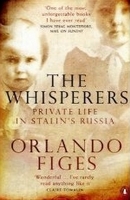|

For three quarters of a century, the Soviet system tried to eradicate any notion of the private life. The Whisperers lets its victims speak, bringing to life for the first time the personal accounts of the ordinary people and families who lived under Stalin’s tyranny.
How could Russian citizens preserve their identity when the state controlled every aspect of their lives? Was any inner life possible when whole families shared rooms in cramped communal apartments, every conversation could be overheard – and at any moment they could be branded an ‘enemy of the people’?
Drawing on hundreds of letters, diaries and memoirs concealed in secret drawers and under mattresses, and on more than a thousand interviews with survivors, Orlando Figes’s extraordinary book recreates the maze in which ordinary Russians found themselves: a world of fear and silence, where an unwitting wrong turn could either destroy a family or, perversely, later save it. Where some kept a bag packed by their bed in order to be ready for a midnight knock on the door. Where a junior worker would inform on their superior to get their job; a husband to get rid of a lover; a neighbour out of petty jealousy. Where millions silently accepted the state’s values for fear of their lives, conforming and often collaborating in a system of terror. Where living a double life became the norm.
This history, one of the most important and involving for many years, reveals a society where everyone spoke in whispers: whether to protect themselves, their families or friends – or to betray them.
Extract from the Introduction:
Antonina Golovina was eight years old when she was exiled with her mother and two younger brothers to the remote Altai region of Siberia. Her father had been arrested and sentenced to three years in a labour camp as a ‘kulak’ or ‘rich’ peasant during the collectivization of their northern Russian village, and the family had lost its household property, farming tools and livestock, to the collective farm. Antonina’s mother was given just an hour to pack a few clothes for the long journey. The house where the Golovins had lived for generations was then destroyed and the rest of the family dispersed: Antonina’s older brothers and sister, her grandparents, uncles, aunts and cousins fled in all directions to avoid arrest, but most were caught by the police and exiled to Siberia, or sent to work in the labour camps of the Gulag, many of them never to be seen again.
Antonina spent three years in a ‘special settlement,’ a logging camp with five wooden barracks along a river bank where a thousand ‘kulaks’ and their families were housed. After two of the barracks were destroyed by heavy snow in the first winter, some of the exiles had to live in holes dug in the frozen ground. There were no food deliveries, because the settlement was cut off by the snow, so people had to live from the supplies they had brought from home. So many people died from hunger, cold and typhus that not all of them could be buried; their bodies were left to freeze in piles until the spring, when they were dumped in the river.
Antonina and her family returned from exile in December 1934, and, rejoined by her father, moved into a one-room house in Pestovo, a town full of former ‘kulaks’ and their families. But the trauma she had suffered in these years left a deep scar on her consciousness, and the deepest wound of all was the stigma of her ‘kulak’ origins. In a society where social class was everything, Antonina was branded a ‘class enemy,’ excluded from higher schools and many jobs, and always vulnerable to persecution and arrest in the waves of terror which swept across the country during Stalin’s reign. Her sense of social inferiority bred in Antonina what she herself describes as a ‘kind of fear,’ that ‘because we were kulaks the regime might do anything to us, we had no rights, we had to suffer in silence.’ She was too afraid to defend herself against the other children who bullied her at school. On one occasion, Antonina was singled out for punishment by one of her teachers, who said in front of the whole class, that ‘her sort’ were ‘enemies of the people, kulak filfth: you were exiled for good reason, and should all be left to rot!’ Antonina felt a deep injustice and anger that made her want to shout out in protest. But she was silenced by an even deeper fear.
This fear stayed with Antonina all her life. The only way that she could conquer it was to immerse herself in Soviet society. Antonina was an intelligent young woman with a strong sense of individuality. Determined to overcome the stigma of her birth, she studied hard at school so that one day she could gain acceptance as a social equal. Despite discrimination, she did well in her studies and gradually grew in confidence. She even joined the Komsomol, the Communist Youth League, whose leaders turned a blind eye to her ‘kulak’ origins because they valued her initiative and energy. At the age of seventeen Antonina made a bold decision that set her destiny: she concealed her ‘kulak’ origins from the authorities – a high-risk strategy – and even forged her papers so that she could go to medical school. She never spoke about her family to any of her friends or colleagues at the Institute of Physiology in Leningrad, where Antonina worked for forty years. She became a member of the Communist Party (and remained one until its abolition in 1991), not because she believed in its ideology, or so she now claims, but because she wanted to divert suspicion from herself and protect her family. Perhaps she also felt that joining the Party would help her career and bring her professional recognition.
For over forty years Antonina concealed the truth about her past from her husband. They rarely spoke to one another about their families – until one day in 1985 when an elderly aunt of Antonina’s husband paid them a visit and let slip that his father was a tsarist naval officer who had been executed by the Bolsheviks. All these years, without knowing it, Antonina had been married to a man, who, like her, had spent his early years in labour camps and ‘special settlements.’
Encouraged by the policies of glasnost introduced by Mikhail Gorbachev, and by the open criticism of the Stalinist repressions in the Soviet media during the late 1980s, Antonina and her husband began to tell each other about their hidden pasts. But they did not speak about such things to their daughter, a schoolteacher, because they feared a backlash against Gorbachev and thought that ignorance would protect her if the Stalinists returned. It was only after the collapse of the Soviet regime, in 1991, that Antonina at last overcame her fear and summoned up the courage to tell her daughter about her ‘kulak’ origins.
The Whisperers reveals the hidden histories of many families like the Golovins, and together they illuminate, as never before, the inner world of ordinary Soviet citizens living under Stalin’s tyranny. Many books describe the externals of the Terror – the arrests and trials, enslavements and killings of the Gulag – but The Whisperers is the first to explore in depth its influence on personal and family life. How did Soviet people live their private lives in the years of Stalin’s rule? What did they really think and feel? What sort of private life was possible in the cramped conditions of a communal apartment, where the vast majority of the urban population lived, if rooms were shared by a whole family and often more than one, and every conversation could be overheard in the next room; or if the state touched almost every aspect of private life through legislation, surveillance and ideological control?
The Whisperers was published in 2007 to international critical acclaim:
Andrei Kurkov in The New Statesman:
'This book is one of the best literary monuments to the Soviet people, on a par with The Gulag Archipelago and the prose of Shalamov.'
Simon Sebag Montefiore in the Mail on Sunday:
'Orlando Figes's awesome work on the misery visited on the Soviet people by their own regimes is one of the most unforgettable books I have ever read. I defy anyone to read it without weeping at its human suffering, cruelty and courage.'
Saul Austerlitz in The Boston Globe:
'Figes, the pre-eminent Russian historian in the English language, has made it his life's work to preserve and understand the nightmarish Soviet century…The Whisperers is the remarkable, deeply moving result…crammed full of humanity, like a Dostoevsky novel brought to life. While it is a scholarly work of history, reading it was one of the most emotionally draining literary experiences I can remember.'
The Whisperers has been translated into over twenty languages. It was short-listed for the Ondaatje Prize and for the Samuel Johnson Prize in 2008.
|







